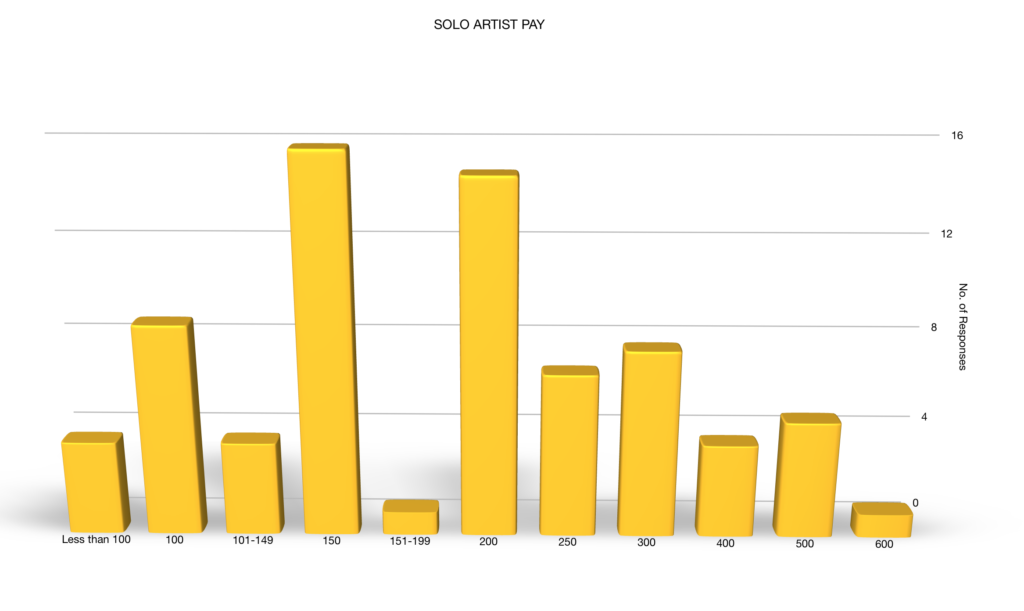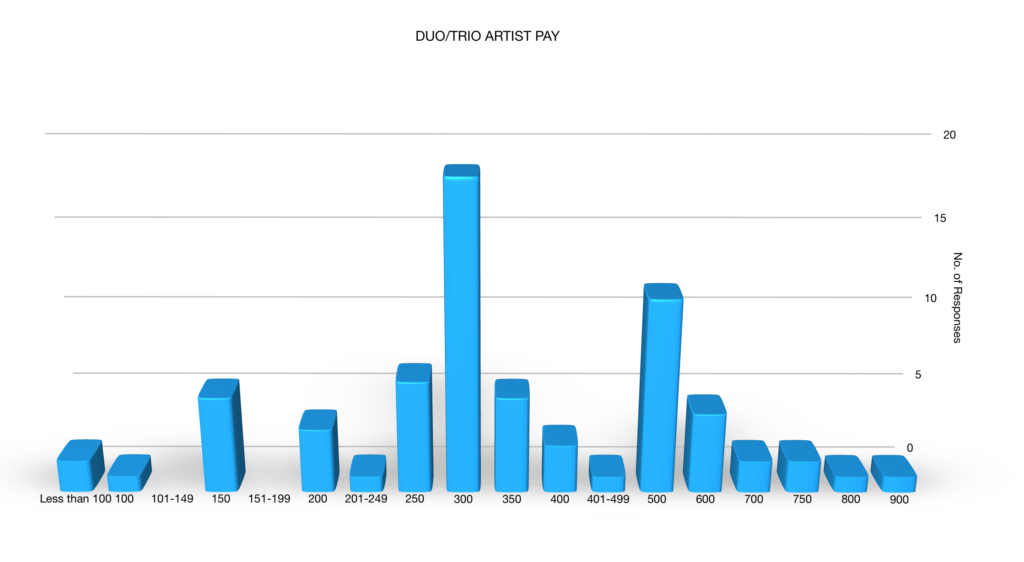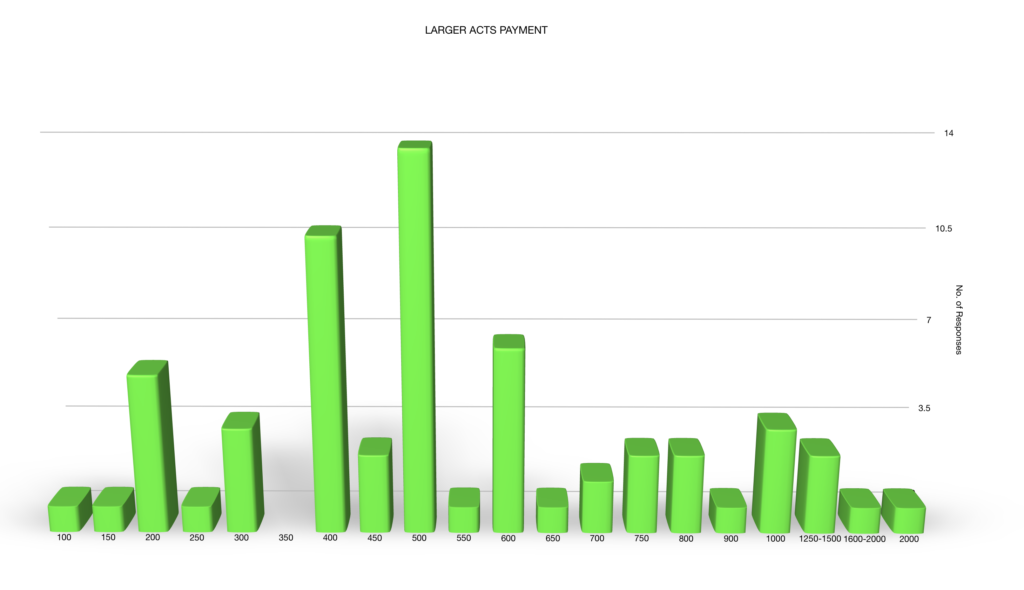What’s Your Worth? : On Artist Wages
It’s a question that elicits a few different thoughts and reactions from different pockets of the world we live in. Artists being held down by “pay to play” or tips based gigs. Competition with others playing the same venues and willing to take less. Those same willing artists, perhaps may have been the slightly lower skew on the survey recently compiled by this publication. Audience members who may not fully grasp the broadness and depth of being an artist…the musician on the stage in front of you didn’t just appear on the stage and start playing. They may have loaded their own equipment and PA in the door, they printed the posters for the show and if local hung them up wherever they could or managed a street team to do the same. They are paying for a hotel that evening to be in the city. They drove 4 hours from the last town they were in. The list goes on and on.
Now, I cannot fully expound on what it means to be a full time touring musician. Even when I was playing 2-3 gigs a week I was still working a rather corporate day gig. Going to an office, wearing slacks and a button down with the occasional tie and had insurance through my work. Music has always been a pleasure for me rather than a thing inside me that I had to bridge passion and employment with. I have done a few short tours, but do not know what it means to be out on the road for 6 weeks, away from home, a home that I am still having to pay rent for or try to sublet while I am away. These are things I can only understand through my friends and folks I admire when they let me in a bit or I am able to lend some kind of reprieve by opening our home to them when they pass through or help create content for them at no cost. Its those moments I cherish because its not just the show, when they are on stage playing for the audience where they are an artist, it is a full time, always have to be thinking about the next move kind of a life style and occupation where a keen, sharp mind and extensive management skills are needed. To those that are able to do this on any level, I have the utmost respect for.
That being said, I recently made friends with someone locally here in my rural corner of the Northeast and we waxed poetic on the disparity of truly great musical experience that we can easily access in this edge of the world without driving an hour and a half to Burlington or the 3 hours to Cambridge. That lead to us talking about starting our own series up and booking the first show. I won’t dwell much on that, but a space where artist and audience share a mutual admiration and benefit. Where artists get paid for their craft and the audience gets paid in a wonderful experience in music and feeling some of that passion that musicians inject into their everyday. So, the big question that came across to me was “how can I do this in a way that is fair to artists and not go broke paying them out of my own pocket?”, which lead to a survey direct from the source (you all, probably, if you are reading this) and the results were a bit polarizing, a bit eye opening, but something I feel like needs to be shared.
I’ll start by saying I left this open for about a day. 75 people from the community replied and in hindsight, I should have asked more questions but feared not getting as much participation if I did. For example, “what is your involvement as a musician/artist?” for starters. Full time touring professional, part time regional touring act, a weekend warrior playing bar gigs…etc. I think a lot of the answers received, particularly on the far ends of the old box and whisker plots (there’s a little 9th grade stats throwback for you that you probably thought you would never hear about again) might have been from either a solo act that mainly does opening slots at small venues (i.e. $50 is a “fair payout”) or a larger/more popular touring act that tax season kills and is unfair to (i.e. $2000 for a trio).
I also took some liberties. Where a participant entered in a range, if the range was greater than $150 (for example “duo should make $450-650) I split the difference and used the middle of the road ($550). Where the range was less than $150, I took the larger number in the range. In going through this exercise, for personal and somewhat selfish reasons, I would rather be on the high end of the scale and be more fair to artists than try and undercut (I’m not SoFar after all…zing). So, while this is “real world data”, take it with a grain of salt (and always try and pay artists more).
This was also a blanket exercise covering all walks of musical life from the sports bar all-star to those who only playing listening rooms and small theatres, so, take that into account.
As a result, there may be some skew in the mix where not every single respondent is a musician perse. But alas, we do what we can and this isn’t getting published in the Harvard Review…
So, anyway, lets get into it.
Solo Artist

This was the most responded to inquiry (perhaps because it was question 2). For my own purposes this means an artist by themselves. More likely than not an “acoustic based” act and probably the category I was most interested in as a baseline as it kind of sets the pace for what each individual artist should make in a band. So artist A (solo) should make $200 a gig for 60-90 minutes then a duo should make $400, a trio around $600 and so on and so on. Based on the info received the mean value for a solo artist calculated out to be $217.50. The median value was $200 and the mode was $150.
Duo/Trio Artists

It may seem difficult to rope these two together, but from my experience, at least in this kind of music, the set up in a folk/Americana duo doesn’t significantly differ or become particularly more complex. I am thinking “fiddle, guitar, upright bass” here. Results were slightly less than my initial projection of “the mean of a solo artist will be X times the number of people in the band”, but I think gives us a gauge of what artists should be getting paid, give, not take. Based on the info received the mean value for a duo/trio artist calculated out to be $369.40. The median value was $350 and the mode was $300.
Larger Act Artists

So, I maybe should have been a tiny bit more clear on this one, but alas, this was an exercise in collection of opinions, so we get what we get. In my thinking this category was “a 4 piece or a 5 piece”. A band with maybe electric guitar, bass and drums. More to haul around, more to set up, more to deal with and obviously, more people in the group to pay. This one also shocked me quite a bit with 36% of the people answering the survey thinking that $450 or less was adequate payment for a band this size. But hey, you are here to draw your own conclusions, right? Based on the info received the mean value for a larger group artist calculated out to be $582.40. The median value was $500 and the mode was $500.
In the end this was a numbers based export of this exercise. There was quite a bit of context involved to that simply is too much work for someone putting off checking his actual work email right now to write up this article (but I do think it is important to get out there). I will say this, of the 75 respondents there was a significant number of mentions of the following contingencies:
- how far does the act have to travel/is this show on route through an area that they band otherwise would not be able to tour through?
- is the host of the concert providing lodging?
- is the host of the concert providing meals?
- is this the sort of event where the attendees actually buy merch (i.e. house concerts)?
- is there also the option of putting out a tip jar in addition to the ticket price?
So, there we go. This is what it is. I think if nothing else it can help us drive forward a conversation about what is a fair wage for artists. Discussions with booking agents, venues and other artists about how they value the people performing at their clubs and how artists value one another by not standing for poor pay or non-guaranteed payment from a venue. It sure as shit is not a perfect science, it may not apply as an overarching guidance for all artists in all situations and I suppose we also need to be brutally honest, not at all musicians do indeed deserve the same pay. Like in any industry or occupation, there are people who are phenomenal at their job, those that are pretty good and those that you get a report from, or see the craftsmanship of hear the song of and question what they are doing. I wouldn’t pay a roofer who can’t hammer a nail straight to replace the roof on my home the same as one that is a fine craftsman and I wouldn’t pay someone who doesn’t sing all too good or write that of great songs the same amount of money that I would for someone who has spent thousands of hours honing their craft and plays impeccably with the voice of a songbird mixed with an angel.
It is also important to note that there is, of course, a sustainability element and conversation for venues and concert hosts. If an artist doesn’t bring anyone out, it is of course a problem. But there is a relationship between artist and venue and shared responsibility that should exist. But that’s another article…
Thanks for playing along folks…

